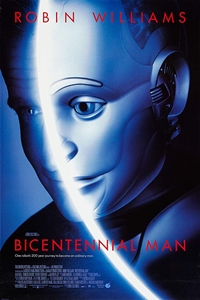Bicentennial Man (PG) No Rating
 In the six years since director Chris Columbus and redoubtable comedic box-office draw Robin Williams joined forces in 1993's enjoyable "Mrs. Doubtfire," the actor has been not only touted for successfully stretching his talent in a variety of dramatic roles, but also increasingly charged with turning in performances for subsequent comedies that rely too heavily on over-sentimentality.
In the six years since director Chris Columbus and redoubtable comedic box-office draw Robin Williams joined forces in 1993's enjoyable "Mrs. Doubtfire," the actor has been not only touted for successfully stretching his talent in a variety of dramatic roles, but also increasingly charged with turning in performances for subsequent comedies that rely too heavily on over-sentimentality.
"Bicentennial Man," his new collaboration with Columbus, is not going to overturn this particular wave of criticism.
Also set in a household requiring domestic help, "Bicentennial" is much more ambitious than the simple premise of a divorced man (in "Mrs. Doubtfire") trying to spend more time with his children by disguising himself as a willful Scottish housekeeper.
Eventually covering 200 futuristic years and following his interactions with several generations of the same family, this particular mechanical housekeeper named Andrew (Williams) is purchased by forward-thinking Richard Martin (a reliable Sam Neill) as the newest addition to their rarefied household.
After some initial amusing misinterpretations, Richard, his wife (the always wifely Wendy Crewson) and daughters (featuring Pepsi tot Hallie Kate Eisenberg as the young "Little Miss") start to recognize this uniquely talented robot's creative abilities, problem-solving skills and depth of feelings (traits uncommon to most robots, but unusually present in Andrew, according to his manufacturer, by "something in the pathways" of his positronic brain).
Interacting with the family empowers Andrew to explore his human qualities and thus begins a centuries-long quest to make his dream of becoming fully human a reality.
One aspect of all this includes seeking procedures (with the help of a robotics expert played by Oliver Platt, fairly wasted here) that will transform Andrew's metallic exterior (and eventually interior as well with prosthetic, then mortal organic components) into a more expressive fleshlike one.
This happens about an hour into the film and has the odd effect of turning what starts out to be an imaginative and personable turn by a robot-suit encased Williams into a dull and ironically even more robotic performance once his face is exposed. The unceasing sentimentality is weary.
Additionally, the story's momentum is constantly broken as the film frequently flash forwards into 10- to 20-year time leaps. What starts off promisingly (especially when viewed at the brink of a new millennium) as an entertaining glimpse into the technologies of the "not too distant future" gets quickly bogged down by its own ambitions.
Isaac Asimov's short story "The Bicentennial Man" and its expansion into the novel "The Positronic Man" (with author Robert Silverberg) reflected a career-long philosophical interest in the notion of lines drawn between robot and human. Asimov ultimately examined robots as being an industrialized product with the capacity to evolve and change the world but has spoken of being "charmed" by stories dealing with "Robot-as-Pathos."
Unfortunately, the sweetness and clarity of his sci-fi fable (most effective in the concise style of the short story) gets lost in the opened-up screenplay for the film by Nicholas Kazan ("Reversal of Fortune," "Fallen").
Particularly ill advised is the insertion of a Forrest Gump-style love story featuring Embeth Davidtz playing a confusing succession of cross-generational women, one of whom motivates Andrew in his desire to become completely human. This thereby sadly alters one the most noble, and touching, character motivations of the original story -- that of an individual's desire to better himself simply for the purpose of self-growth and awareness.
With a reported production budget of $100 million (co-financed by Disney and Columbia Pictures), technical aspects of the film are glossy but not especially visionary. Music by "Titanic" Oscar-Winner James Horner is disappointingly demonstrative.
* MPAA rating: PG, for language and some sexual content.
"Bicentennial Man"
Robin Williams: Andrew Martin
Embeth Davidtz: Little Miss Portia
Sam Neill: Sir
Oliver Platt: Rupert Burns
Stephen Root: Dennis Mansky
A Buena Vista presentation. Director Chris Columbus. Screenplay Nicholas Kazan. Story Isaac Asimov. Novel Robert Silverberg. Director of photography Phil Meheux. Editor Neil Travis. Production designer Norman Reynolds. Costume designer Joseph G. Aulisi. Art director Mark Mansbridge. Running time: 2 hours, 13 minutes.
To get the full Quicklook Films experience, uncheck "Enable on this Site" from Adblock Plus
box office top 10

Civil War Released: April 12, 2024 Cast: Kirsten Dunst, Wagner Moura 11.1M

Abigail Released: April 19, 2024 Cast: Melissa Barrera, Dan Stevens 10.2M

Godzilla x Kong: The New Empire Released: March 29, 2024 Cast: Rebecca Hall, Brian Tyree Henry 9.5M

The Ministry of Ungentlemanly Warfare Released: April 19, 2024 Cast: Henry Cavill, Eiza Gonzalez 9M

Spy x Family Code: White Released: April 19, 2024 Cast: Takuya Eguchi, Saori Hayami 4.9M

Kung Fu Panda 4 Released: March 8, 2024 Cast: Jack Black, Viola Davis 4.6M

Ghostbusters: Frozen Empire Released: March 22, 2024 Cast: Paul Rudd, Carrie Coon 4.4M

Dune: Part Two Released: March 1, 2024 Cast: Timothée Chalamet, Rebecca Ferguson 2.9M

Monkey Man Released: April 5, 2024 Cast: Dev Patel, Sikandar Kher 2.2M

The First Omen Released: April 5, 2024 Cast: Nell Tiger Free, Bill Nighy 1.7M






